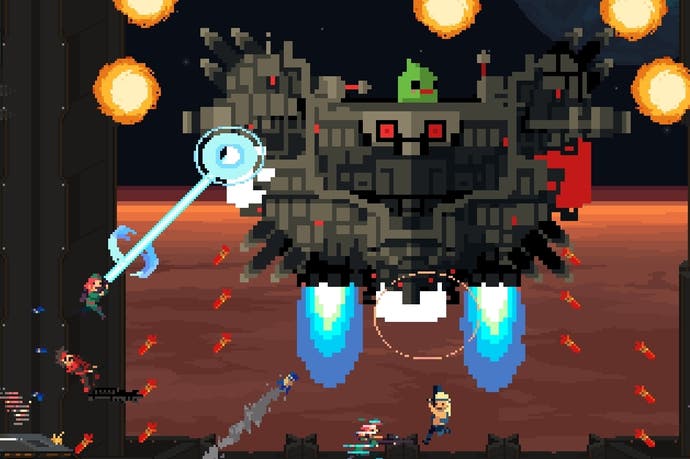Actual New Games of 2013
More wonder, more awe.
New IPs, we're told, aren't really feasible at the tail-end of a generation, so it's heartening to sit down and discover that a sizeable part of the games industry is sticking its tongues out at the likes of Yves Guillemot and Peter Moore; 2013's looking like it's going to be an absolutely stellar year for Actual New Games.
So what's an Actual New Game, then? Cast your mind back through the fog of the past 12 months and you might recall Tom defining them as games that "invent new styles and genres... games that we can't easily decode from the first half an hour of play, and that leave us brimming with wonder and excitement and babbling to one another about the amazing things they do."
2012 didn't do too bad in that regard. There was the unexpected pleasure of Brendon Chung's 30 Flights of Loving, or the melancholy spirituality of Journey. And then were the games that reminded us of styles so long forgotten they felt new: Dishonored's mesh of stealth, mystery and a gloriously realised world, The Walking Dead's emotionally charged revival of the adventure genre or XCOM's muscular strategy.
2013's full of strange new things to get excited about. It helps, of course, that the console cycle is turning over once again, and there's a handful of games here that will most likely crop up on hardware old and new. More relevant, though, is that the majority of these games couldn't care less about a notion as archaic as hardware generations: these are the games that are emerging from the brave lands of free-to-play, independent development and PC, and they're the games that promise an extension of what really feels like a bit of a creative golden age. Here's to them, to the Actual New Games we're yet to catch wind of and to another 12 months of wonder.
Clang! (Subutai Corporation, PC)
Neal Stephenson writes deliriously complex novels about technology and sword-fighting, so it's probably not surprising than he's now using technology in the aid of sword-fighting - via this motion-controlled PC game that promises to teach the intricacies of the world's great blade arts.
Fuelled with Kickstarter money and a little help from his friends at Valve, Stephenson's plan probably isn't as insane as it seems, but it is fairly ambitious. On top of a decent combat game, Clang! also wants to provide tools to allow users to build their own content, adding different sword disciplines over time and maybe even giving people funny little hats to collect. That last bit's made up, but who knows? People love collecting hats.
The Duellist: Chris caught up with Neal last year to talk through Clang!, and the influence of games on the sci-fi writer's work.

Wonderful 101 (Platinum Games, Wii U)
Now he's not having to spend his time penning pithy putdowns on Twitter for people asking when Bayonetta 2's going to be announced, Platinum Games' Hideki Kamiya can at last remind us why everyone fell in love with him in the first place: because he's responsible for some of the most eccentric, energetic games going.
He's a brave soul, Kamiya, so it's no surprise to see him spoiling for a fight again. Having seemingly severed its ties with Sega, Platinum's first game for Nintendo is a colourful, comic book styled spin on the light strategy of Pikmin. There's an emphasis on combat that's got the candy-coated kinetic snap of the likes of Bayonetta, and an eagerness to work through all the tricks that the Wii U's GamePad allows. An exciting prospect, then, and most definitely a unique one.
Viewtiful: Wonderful 101 emerged as the highlight of the Wii U's first batch of games, and Chris got very excited indeed about it last summer.
Quadrilateral Cowboy (Blendo Games, PC)
In front of you: a grille. Beyond it: a row of security cameras. Oh, and you're a hacker, okay? Take those obstacles down. Go on. Hack.
In most other games this would trigger a roll of the eyes, a twitch of the keyboard, and then an abstract, rather puzzley mini-game or a few belaboured QTEs. Thankfully, Quadrilateral Cowboy is not most other other games. Instead, Thirty Flights designer Brendon Chung has armed you with your own portable hacking laptop, a blinking command line, and a rudimentary programming language to learn.
A grille. Security cameras. Hack them.
Can't wait.
Gold Blendo: We've yet to play Blendo's latest, but reading through Oli's thoughts on its last game should fill you with all sorts of giddy excitement for it.
Destiny (Bungie, Xbox 360/PS3/PC)
It's not really been announced yet - although it kind of has. And no-one really knows much about it - apart from a fair idea of when it's out, what it's out on, how many sequels are planned as well as the team's precise dietary requirements.
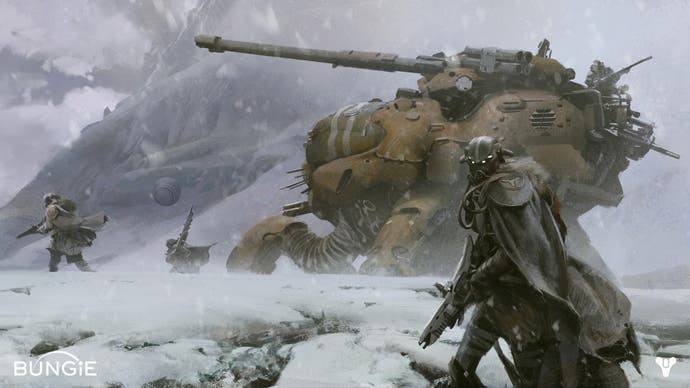
There's one thing we definitely know, though - it's that this is Bungie's first new IP since it helped define the console shooter with Halo: Combat Evolved in 2001, and the Bellevue developer's going to be keen to deliver something with just as large an impact. A co-op shooter fuelled by micro-transactions and regular DLC drops that sees a slight return to a world of fantastical sci-fi? No-one's really sure just yet, but this is guaranteed to be one of the biggest and most spectacular games of 2013.
Monaco (Pocketwatch Games, Xbox 360/PC/Mac)
It's Ocean's Eleven told through blueprints. It's Hotline Miami with lock-picking instead of neck-breaking.
Actually, it's Monaco: a slick and inventive action game in which you conduct heists in a series of complex environments, peering down at the pixelated world from above as you evade guards, loot safes, and leg it out the window before the CCTV cams have seen you. Or maybe you stumble into the first alarm, blind yourself with an accidental smoke bomb and then get eaten by attack dogs - your choice.

South Park: Stick of Truth (Obsidian, Xbox 360/PS3/PC)
Every time the age-old notion of licensed games being turgid cash-ins is dispelled by an Arkham City or Telltale's The Walking Dead, along stumbles a reminder of the bad old naughty days when a little less respect was given to big brands and their fans. I'm looking at you, 007: Legends, and, er, Activision's The Walking Dead.
South Park was one of those ill-handled brands a few years back, but the video-game tie-ins have slowly crawled back from mediocrity to, with last year's brace of downloadable games, something approaching competency. THQ and Obsidian's forthcoming RPG should be able to tip that over into excellence, and The Stick of Truth has all the ingredients to be a success: a cartoon cut-out style that's a perfect replica of the show, as well as the presence of creators Matt Parker and Trey Stone, are enough to make this a tie-in that's worth paying attention to.
Fortnite (Epic Games, PC)
Fortnite's garnered a fair amount of interest due to the fact that it's provided the first sighting of Unreal Engine 4 technology. It's a pleasure, then, to find out that the game itself sounds pretty promising, too.
It's a game of two halves: scavenge and explore sandboxy environments during the day, and then head back to your base to shore up its perimeter and prepare for hordes of monsters when night falls. Blending elements from tower defence titles and Minecraft before wrapping everything up in a chunky CGI kids' show aesthetic, Fortnite could be brilliant.
Beyond: Two Souls (Quantic Dream, PS3)
David "I'm not a frustrated movie director" Cage has gone out of his way to create a game that leans more heavily on the work of cinema than most. There's the presence of Hollywood talent in the form of Ellen Page (although that's hardly a first - remember when Bruce Willis fronted the less-than-brilliant PSOne shooter Apocalypse?) and the frightening prospect of a 2000 page script penned by Cage himself.
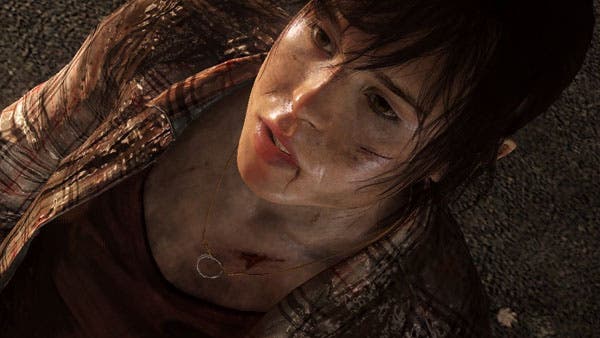
But Beyond's biggest loan from cinema is in how it places an emphasis on the actor's performance, and about how it translates each nuance in Page and her colleague's work into an engine that tugs at the far reaches of the PlayStation 3's limits. The only question, as ever in a David Cage game, is how much performance there's left for the player to take on, or if you're going to be merely an extra in this intriguing narrative hybrid.
First Casting: Beyond's reveal was prefaced by Project Kara, a showcase for Quantic Dream's new tech. Martin spoke to David Cage about it early last year.
Gone Home (Fullbright Company, PC/Mac)
Dragons, spaceships, super-spies: this is the stuff of video games. It's a bold design team that steps away from the fantastical, and an even bolder one that embraces plain old domesticity. Luckily, the team at the Fullbright Company seem to be pretty bold people.
With Minerva's Den on their resumes, the designers want to take you back to the mid-nineties and a large, empty family house. Where's everybody gone?
Who knows. Head inside, shake the doorknobs, find the hidden keys, open drawers, and even read through someone's three-page term paper if you fancy: Gone Home promises to be a down-to-earth mystery yarn told through environmental detailing and powered by your own curiosity.
Homecoming: Jeff explored Fullbright's new game as last year came to a close, transporting himself back to a brilliantly realised 1995 home.
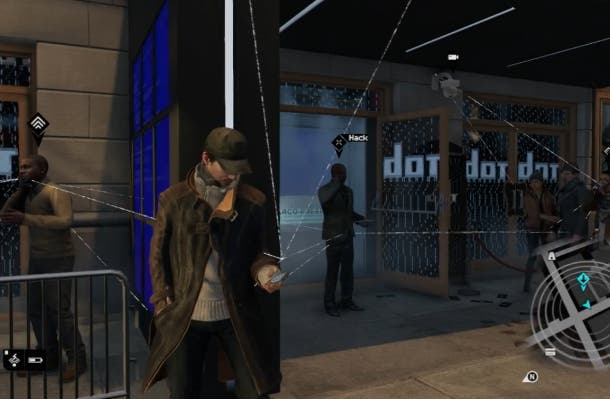
Watch Dogs (Ubisoft Montreal, Xbox 360/PS3/PC)
Ubisoft's Watch Dogs provides a vision of the future that's chilling and electrifying all at once. It's a place where a smartphone can grant you the power to bring down entire city blocks, where private data's a cold commodity and where strange artists harbour sinister agendas.
It's also a future where games are developed by small nations, look shockingly expensive and blend genres in an open world that's rich with possibility. There's little doubt that Ubisoft's game is going to be making an appearance in some shape or form on the next generation of consoles, and it's a startling peek into the kinds of experiences we can expect on Sony and Microsoft's next machines.
Dog Days: Watch Dogs stole the show at E3 2012, and Fred was first in line to see the game in full.
The Showdown Effect (Arrowhead Game Studios, PC/Mac)
A warm and rather fuzzy slaughterhouse, The Showdown Effect offers side-scrolling death match action dripping with every conceivable '80s and '90s action movie cliche known to man. Knives are thrown, windows are breached, and grenades lead to truly glorious fireballs: welcome to the party, pal.
It promises to be wonderfully mindless stuff, in other words, and while there are modern concessions like character levelling and in-game streaming promised, if any of 2013's treats is likely to put you back in the reeking gloom of an old half-remembered video rental shop, this is it.
Mighty Quest for Epic Loot (Ubisoft Montreal, PC)
Ubisoft's setting its sights on free-to-play this year, and Mighty Quest for Epic Loot looks like a very smart way of doing things. Behind the chunky cartoon visuals lies a wonderfully nasty blend of dungeon-builder and dungeon-raider: you piece together your own castle filled with death traps and shambling horrors, upload it, and then head online to try and work your way through other peoples' ghastly constructions.
The interface is elegant and idiot-proof and there's a neat cost system in place to ensure people don't overload their castles with dragons in order to make them unbeatable. Speaking of costs, this one's going to live or die based on the integration of its economy: Ubisoft's promising that you'll be able to play through everything without spending any money at all, and hopefully the designers have done enough research to get the balancing right.
Deadly Rooms of Debt: Chris caught sight of Mighty Quest last year, and came away impressed.
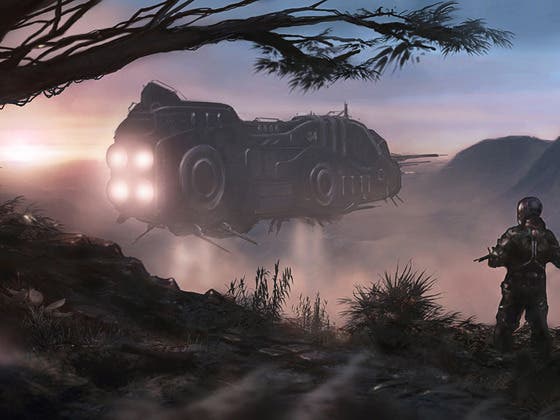
Maia (Simon Roth, PC)
A sci-fi god game about protecting a group of colonists on an inhospitable alien world, it's probably a good thing that Maia reached its Kickstarter target last year. It's sold as a cross between Dungeon Keeper and Dwarf Fortress, which might go some way to explaining why crowd-sourcing was a better means of defraying production costs than a Ben-10 licence and a deal with the likes of Activision, and its art promises to invoke the glory days of 1970s space films.
Meteor strikes, seismic activity and alien nastiness all threaten the lives of your settlers as you create a network of sub-surface chambers for them to live in. This carnival of extra-terrestrial horrors has been put together by Frontier alumus Simon Roth, incidentally, and it's set in Tau Ceti, which has been in the news recently because there's a good chance one of the planets is habitable. Now that's marketing.
Maian Prophecy: Paul explored the strange world of Maia last year, speaking to Simon Roth in the process.
Tearaway (Media Molecule, Vita)
Media Molecule's picked up Sony's ailing Vita and appears to have shaken the console until all manner of weird ideas rolled out. The result is Tearaway, a crinkly papercraft adventure that encourages you to interact with the world on the front screen by poking your fingers right through the screen at the back.
Not literally, of course: it's all down to augmented reality. While most implementations of AR seem cheap and a little gimmicky, though, Media Molecule's wit and tactile nous promises something a bit more interesting than your typical UFO hunter app. Bounce your little hero across drums, prod ancient machines to life and herd enemies with a roving thumb: the Vita needs games made with this kind of creativity and care.
World of Papercraft: Soon after its announcement at Gamescom 2012, Martin sat down with Media Molecule to go through the world of Tearaway.
The Witness (Jonathan Blow, PC/iOS)
Jonathan Blow's latest is about making connections: tackling a series of single-screen maze puzzles waiting for you on PC monitors as you explore a mysterious island, and then stepping back to see how the larger puzzle of the island itself - and a strange narrative that unfolds, one audiolog at a time - fits together, too. It sounds disconnected and rather distancing, but in reality it's mesmerisingly coherent - another playful adventure sliced up into perfectly manageable chunks, another glimpse of Blow's own personal Galapagos archipelago, where established game ideas have evolved in some wonderfully strange ways.
Lost in Paradise: Confused as to what The Witness is? Chris attempted to unravel the enigma back in 2011.
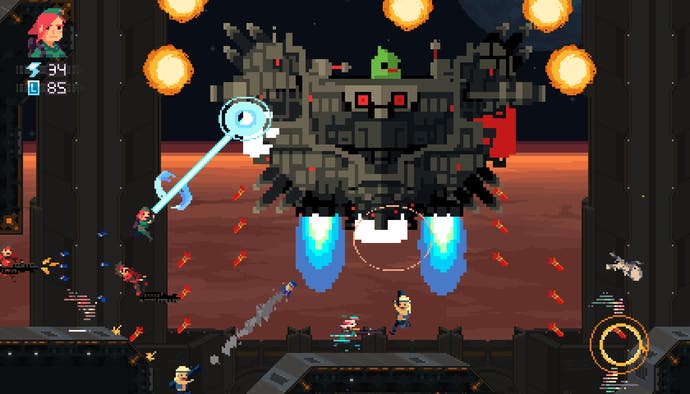
Super Time Force (Capybara Games, Xbox 360)
"You're basically playing co-op with the dead you." God, 2013's going to be brilliant for games.
The quote's from Capybara Games' Nathan Vella, by the bye, and it describes Super Time Force, a colourful 2D shooter the team's been working on. One-hit kills, waves of enemies, a little light platforming? So far, so Contra - but then you die, and then your dead selves come to your aid.
Each time you kick it, you're creating a copy of yourself that replays over and over again, adding another soldier to your growing army. These ghostly shades can still take down enemies and get you out of a tight spot: it's a bit like sampling and looping, but with geometry and ballistics instead of music. Oh, and apparently the writing's very funny, too.
Contra-band: Super Time Force is a super-hard, super-stylish and super-smart action game Steve Haske said last year, giving us even more reason to be excited about Capy's game.
